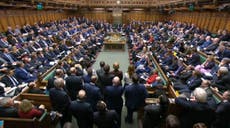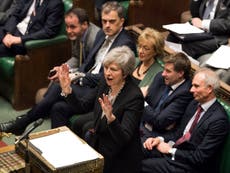What happens to Brexit now? Yvette Cooper didn’t win tonight, but she will eventually
The backstop can be tweaked, but there is no way the EU would be prepared to ‘replace’ it, as the Brady amendment demands

In the end, Yvette Cooper’s attempt to “take no-deal Brexit off the table” failed by a clear margin. That means the prime minister has one last chance to try to hold the Conservative Party together – with one more attempt to secure a change to the withdrawal agreement.
Theresa May won the mandate she sought from her own party and its DUP partners. They voted with remarkable discipline and unity for Sir Graham Brady’s amendment approving her Brexit deal on condition that she replace the backstop guarantee of an open border in Ireland.
That gives her the chance to go back to Brussels and say there would be a majority in parliament for her deal if other EU leaders were prepared to give her something to overcome MPs’ problems with the backstop. I don’t think she will get anything that will satisfy all 317 MPs who voted for the Brady amendment.
The backstop can be tweaked, but there is no way the European Union would be prepared to “replace” it, as the Brady amendment demands.
So soon we will be back to square one, which means that, although Cooper’s amendment didn’t pass tonight, something like it will before we get too close to the 29 March deadline.
It is often said there is no majority for any of the Brexit options in the House of Commons, but the one thing we do know is that there is a majority against the UK leaving the EU without a deal. This was underlined by the surprise win for the amendment tabled by Caroline Spelman, the Tory former cabinet minister, which simply declared that this House rejects leaving without a withdrawal agreement. It was carried by just eight votes, and the vote has no legal force, unlike the Cooper amendment, which would have provided for a bill.
But there is no doubt there is a much larger majority in the Commons opposed to a no-deal Brexit, and that it will make itself felt more forcefully if and when the prime minister fails to secure the support of the DUP and many of her backbenchers for a cosmetically “revised” deal.
More than that, Theresa May herself doesn’t want to leave without a deal. A “cabinet source” was reported by The Sun at the weekend as saying: “The PM has made quite clear that she’s not going to go for no deal.” But she is not yet prepared to say so, because she wants to retain her negotiating leverage.
What is more, the other EU leaders and their negotiators know all this. They know that neither the UK government nor the overwhelming majority of the House of Commons wants to leave without a deal. So the incentive for them to make further compromises is limited.
In the end, if parliament fails to approve a deal, Yvette Cooper will table another amendment to change the law to require the prime minister to seek a delay to Brexit. She may do it when Theresa May next asks the Commons to vote on a deal, on 14 February, or she may do it later. But at some point the Commons will accept the principle that the alternative to a deal would be to postpone Brexit. It will then face the choice between approving the prime minister’s deal, which might have some superficial changes, or extending the Article 50 deadline – which could lead to a new referendum and to the country deciding to stay in the EU after all.
Faced with that binary choice, with the deadline looming, I don’t think anyone knows how the House of Commons would vote.






Join our commenting forum
Join thought-provoking conversations, follow other Independent readers and see their replies